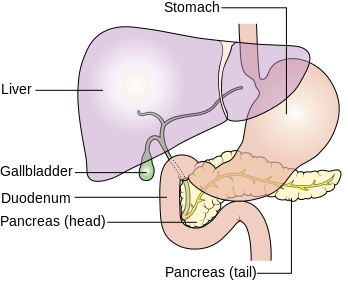Pancreatic neuroendocrine tumor: Difference between revisions
Shanshan Cen (talk | contribs) |
Shanshan Cen (talk | contribs) No edit summary |
||
| Line 50: | Line 50: | ||
[[Pancreatic neuroendocrine tumor case study one|Case#1]] | [[Pancreatic neuroendocrine tumor case study one|Case#1]] | ||
== | ==Genetics== | ||
{{ | |||
[[DNA]] [[mutation]] analysis in well-differentiated pancreatic neuroendocrine tumors identified four important findings:<ref name="Jiao2011">{{cite journal |author= Jiao, Y.; Shi, C.; Edil, B. H.; De Wilde, R. F.; Klimstra, D. S.; Maitra, A.; Schulick, R. D.; Tang, L. H.; Wolfgang, C. L.; Choti, M. A.; Velculescu, V. E.; Diaz Jr, L. A.; Vogelstein, B.; Kinzler, K. W.; Hruban, R. H.; Papadopoulos, N.|title= DAXX/ATRX, MEN1, and mTOR Pathway Genes Are Frequently Altered in Pancreatic Neuroendocrine Tumors|journal= Science |volume= 331|issue=6021 |pages=1199–1203|year=2011 |pmid= 21252315|doi= 10.1126/science.1200609}}</ref><ref name=" McKenna2014">{{cite journal |author= McKenna, L. R.; Edil, B. H. |title= Update on pancreatic neuroendocrine tumors |journal= Gland surgery |volume= 3|issue=4 |pages=258–275|year=2014 |pmid=25493258|doi= 10.3978/j.issn.2227-684X.2014.06.03}}</ref> | |||
* as expected, the [[gene]]s mutated in NETs, [[MEN1]], [[ATRX]], [[DAXX]], [[TSC2]], [[PTEN (gene)|PTEN]] and [[PIK3CA]],<ref name="Jiao2011" /> are different from the mutated genes previously found in [[pancreatic cancer|pancreatic]] [[adenocarcinoma]].<ref name="Jones2008">{{cite pmid|18772397}}</ref><ref name="Harada2009">{{cite pmid|19077451}}</ref> | |||
* one in six well-differentiated pancreatic NETs have mutations in [[mTOR]] pathway genes, such as [[TSC2]], [[PTEN (gene)|PTEN]] and [[PIK3CA]].<ref name="Jiao2011" /> The sequencing discovery might allow selection of which NETs would benefit from mTOR inhibition such as with [[everolimus]], but this awaits validation in a [[clinical trial]]. | |||
* mutations affecting a new cancer pathway involving [[ATRX]] and [[DAXX]] genes were found in about 40% of pancreatic NETs.<ref name="Jiao2011" /> The proteins encoded by ATRX and DAXX participate in [[chromatin]] remodeling of [[telomere]]s; these mutations are associated with a [[telomerase]]-independent maintenance mechanism termed ALT (alternative lengthening of telomeres) that results in abnormally long telomeric ends of [[chromosomes]]. | |||
* [[ATRX]]/[[DAXX]] and [[MEN1]] mutations were associated with a better [[prognosis]].<ref name="Jiao2011" /> | |||
==References== | ==References== | ||
Revision as of 19:21, 17 August 2015
| Pancreatic neuroendocrine tumor | |
| Classification and external resources | |

| |
|---|---|
| ICD-10 | C25.4 |
| eMedicine | med/ |
|
Pancreatic neuroendocrine tumor Microchapters |
|
Differentiating Pancreatic neuroendocrine tumor from other Diseases |
|---|
|
Diagnosis |
|
Treatment |
|
Case Studies |
|
Pancreatic neuroendocrine tumor On the Web |
|
American Roentgen Ray Society Images of Pancreatic neuroendocrine tumor |
|
Directions to Hospitals Treating Pancreatic neuroendocrine tumor |
|
Risk calculators and risk factors for Pancreatic neuroendocrine tumor |
For patient information on this page, click here
Editor-In-Chief: C. Michael Gibson, M.S., M.D. [1]
Synonyms and keywords: Islet-cell carcinoma
Overview
Historical Perspective
Classification
Pathophysiology
Causes
Differentiating Pancreatic neuroendocrine tumor from other Diseases
Epidemiology and Demographics
Risk Factors
Natural History, Complications and Prognosis
Diagnosis
Staging | History and Symptoms | Physical Examination | Laboratory Findings | Other Imaging Findings | Other Diagnostic Studies
Treatment
Medical Therapy | Surgery | Primary Prevention | Secondary Prevention | Future or Investigational Therapies
Case Studies
Genetics
DNA mutation analysis in well-differentiated pancreatic neuroendocrine tumors identified four important findings:[1][2]
- as expected, the genes mutated in NETs, MEN1, ATRX, DAXX, TSC2, PTEN and PIK3CA,[1] are different from the mutated genes previously found in pancreatic adenocarcinoma.[3][4]
- one in six well-differentiated pancreatic NETs have mutations in mTOR pathway genes, such as TSC2, PTEN and PIK3CA.[1] The sequencing discovery might allow selection of which NETs would benefit from mTOR inhibition such as with everolimus, but this awaits validation in a clinical trial.
- mutations affecting a new cancer pathway involving ATRX and DAXX genes were found in about 40% of pancreatic NETs.[1] The proteins encoded by ATRX and DAXX participate in chromatin remodeling of telomeres; these mutations are associated with a telomerase-independent maintenance mechanism termed ALT (alternative lengthening of telomeres) that results in abnormally long telomeric ends of chromosomes.
References
- ↑ 1.0 1.1 1.2 1.3 1.4 Jiao, Y.; Shi, C.; Edil, B. H.; De Wilde, R. F.; Klimstra, D. S.; Maitra, A.; Schulick, R. D.; Tang, L. H.; Wolfgang, C. L.; Choti, M. A.; Velculescu, V. E.; Diaz Jr, L. A.; Vogelstein, B.; Kinzler, K. W.; Hruban, R. H.; Papadopoulos, N. (2011). "DAXX/ATRX, MEN1, and mTOR Pathway Genes Are Frequently Altered in Pancreatic Neuroendocrine Tumors". Science. 331 (6021): 1199–1203. doi:10.1126/science.1200609. PMID 21252315.
- ↑ McKenna, L. R.; Edil, B. H. (2014). "Update on pancreatic neuroendocrine tumors". Gland surgery. 3 (4): 258–275. doi:10.3978/j.issn.2227-684X.2014.06.03. PMID 25493258.
- ↑ PMID 18772397 (PMID 18772397)
Citation will be completed automatically in a few minutes. Jump the queue or expand by hand - ↑ PMID 19077451 (PMID 19077451)
Citation will be completed automatically in a few minutes. Jump the queue or expand by hand